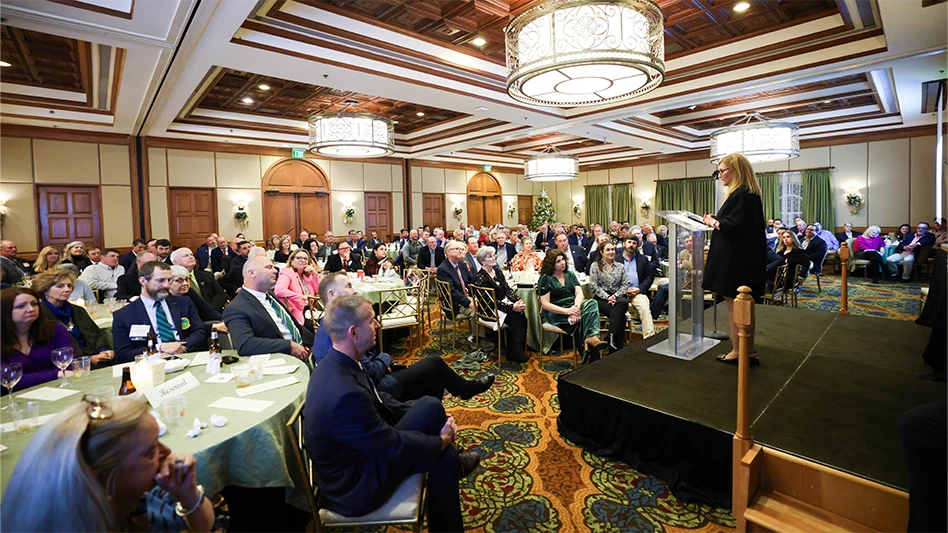In 1962, Jim Fitzgibbon and Bob Burkhardt founded a local supply business, Lakeshore Equipment and Supply Co., selling turf maintenance equipment to lawn and landscape contractors near its Cleveland headquarters. Forty five years later, that internationally known company, LESCO, reached more than $570 million in sales through its 350 service centers and 110 Stores-on-Wheels.
|
|
Throughout 2006, the company made news as it transitioned from its dual focus as a distributor and manufacturer and struggled with profitability and keeping shareholders happy. Amid management changes and persistent sales rumors, the company continued to open new locations and build and strengthen relationships with superintendents and landscape contractors who relied on the company for product purchases and technical expertise.
Earlier this year, John Deere purchased LESCO and merged it with its subsidiary, John Deere Landscapes, to increase the volume of consumable products sold by John Deere Landscapes and complement John Deere’s Golf & Turf One Source business, which focuses on bringing solutions to golf course superintendents.
David Werning, president of John Deere Landscapes and senior vice president of the John Deere Commercial & Consumer Equipment Worldwide, spent time in the field interviewing employees and customers to ensure solid service during the transition and into the future. Werning discusses the acquisition and future plans for the company.
GCI: How does a larger organization (John Deere Landscapes) meet the needs of customers better than a smaller one (LESCO)?
DW: Business takes place on the local level. Therefore, we believe customer service can be provided only at the local level. Corporately, things can be centralized for efficiency, but customer service isn’t one of them. Whether it’s a small one-store operator or a company with 650 locations, the customer’s experience is defined by the service provided at that one store.
We’re a larger company that allows us to do things smaller businesses can’t do. Subsequently, our store managers can keep their eye on the ball and take care of the customer. Local stores are authorized to make decisions based on the unique needs of their customers.
GCI: How have LESCO employees responded to the merger?
DW: The reception we’ve received from all field employees – both John Deere Landscapes and LESCO – has been refreshing and far exceeded my expectations. It’s what you hope to see – cooperation taking place at the local level. For example, if a LESCO store has to make delivery of three to four pallets of product for a customer and can’t make it for some reason, he can call a John Deere Landscapes guy and ask for help for the good of the customer.
GCI: How many service locations will close as a result of the merger?
DW: There’s no initiative that says we’re going to close stores. It’s not in any part of our planning. Once the acquisition was announced, we visited John Deere Landscapes and LESCO customers in 10 major metro service areas asking for their input. We asked them to help build a business model that would work. Much of this business is about the people. It would be mistake to close branches and lose their expertise. We plan on increasing sales and stores, so why lose people.
We have cases in which branches are located across the street from each other. As leases expire, we’ll look at the long-term viability of each location. As long as we can provide the same level of service, we’ll consider consolidating stores, but we’ll maintain the people from each store who have the product line expertise and customer relationships.
During the next four to five years, we have a robust schedule of opening new stores. We see an opportunity to expand in areas without a significant presence. John Deere Landscapes has about 300 stores. LESCO has 350 and 110 Stores-on-Wheels. Our plan is to grow more than 20 to 30 stores a year. We’re underrepresented in the West, so there’s a growth opportunity for us. John Deere Landscapes and LESCO each have a distinct customer base. If we didn’t close any stores, it wouldn’t disappoint me.
GCI: What’s the total job loss at LESCO?
DW: In the best of situations, a merger calls for change. I don’t have a specific number of employees who will be eliminated. We keep focusing on how we’ll run the company moving forward, and what the number of people the business demands. Our driving belief is to right-size the company. The changes made at the Cleveland office were about right-sizing.
We weren’t in the core business that LESCO was. We’ve identified those core competencies and those people who are valuable to us and have communicated with the employees who are affected by changes.
GCI: What’s changed at the local level?
DW: It’s a big company. We still need to peel the onion and see what’s different. There’s different reporting and operating procedures, but that much hasn’t changed. It’s still a familiar person behind the counter. Where LESCO has been and where it’s returning to is similar to the way John Deere Landscapes operates. You can’t provide customer service from afar. The only person who’s able to make those decisions relative to customer service is the guy standing behind the counter. He’s trained and educated. It’s his job to make the decisions necessary to ensure the customer is provided with the service needed.
GCI: What will happen to the LESCO name?
DW: We have two strong names in LESCO and John Deere Landscapes. It would be ridiculous to get rid of the LESCO brand name. From a consistency standpoint, we’ll convert the storefront over time from LESCO to John Deere Landscapes. But we have no intentions of removing the LESCO brand from the products available. We’re in no great hurry to convert the storefronts. It will roll out and change throughout time as leases expire and changes take place.
GCI: What will happen with Stores-on-Wheels?
DW: The primary graphics on the trucks will stay the same, but the John Deere Landscapes name will be added. We have no physical truck changes on the horizon. Products carried on the trucks will be determined by customer demands and requirements.
GCI: How much crossover in products will appear at former LESCO and John Deere Landscapes branches?
DW: When we open a new store in a new area, there will be extensive crossover of products. However, in markets with a density of stores, the crossover will be minimal. We’ll do what customer convenience requires. If customers who regularly go into a LESCO store need maintenance or repair parts for an irrigation system, we’ll carry those. But we won’t carry a full line of irrigation products. It’s all about the convenience of the customers, and it will evolve over time. The key is to maintain the expertise at the store and not dilute the focus on any customer.
GCI: What relationship will the new John Deere Landscapes/LESCO branches have with John Deere equipment dealers?
DW: The first phase is operating John Deere Landscapes and LESCO as one company. We need to get systems and processes squared away. LESCO mowers will continue to be sold in the same manner as they are currently sold, but long term, we’ll look for opportunities and ways to help our Deere dealer partners.
GCI: How similar are the customer bases of John Deere Landscapes and LESCO?
DW: Our John Deere Landscapes customers primarily have come from the installation side of the business, i.e., irrigation, hardscapes and nursery. LESCO customers are more maintainers of the landscape, i.e., lawn care, mowing and fertilizing. The merger of John Deere Landscapes and LESCO is one of expertise and customer bases.
GCI: How has distribution changed and evolved throughout the years?
DW: There’s been consolidation. A lot of it is because of the need for scale and scope, and the need to provide services customers are requesting. We talk to our customers every day asking them for ideas and suggestions besides the basics. Delivery capabilities, fair and reasonable pricing, and knowledgeable people behind the counter are key. It’s where a large part of distribution is going.
GCI: What do you anticipate from the service industries – lawn care, landscape and golf – that you serve during the next few years?
DW: We have opportunities to look at the markets – individually and combined – to develop a business that can best serve each market. We have opportunities to increase our number of stores and to identify new customers.
John Deere looked at LESCO for a long time. They’re the leaders on the consumable side of the business. By combining consumables with equipment, i.e., LESCO service centers and Stores-on-Wheels, working in tandem with John Deere dealers, we’ll be providing an integrated business approach to the superintendent and the contractor. GCI
Latest from Golf Course Industry
- Advanced Turf Solutions and The Aquatrols Company release soil surfactant
- Heritage Golf Group acquires North Carolina courses
- Editor’s notebook: Green Start Academy 2024
- USGA focuses on inclusion, sustainability in 2024
- Greens with Envy 65: Carolina on our mind
- Five Iron Golf expands into Minnesota
- Global sports group 54 invests in Turfgrass
- Hawaii's Mauna Kea Golf Course announces reopening






